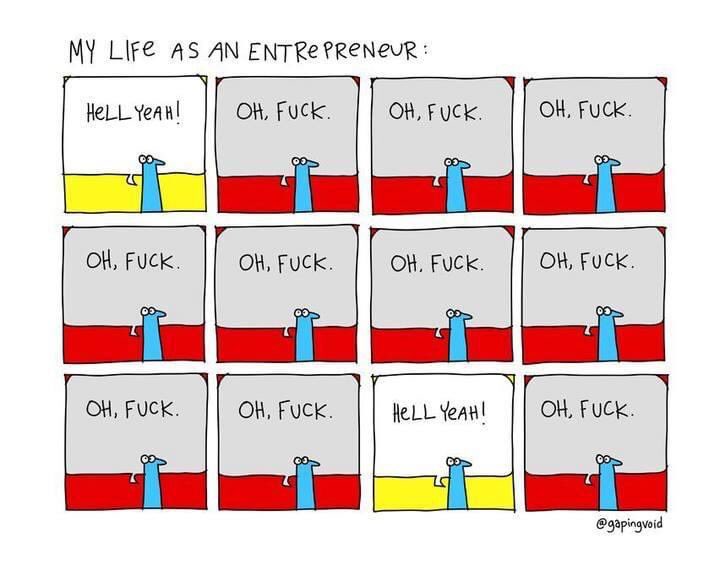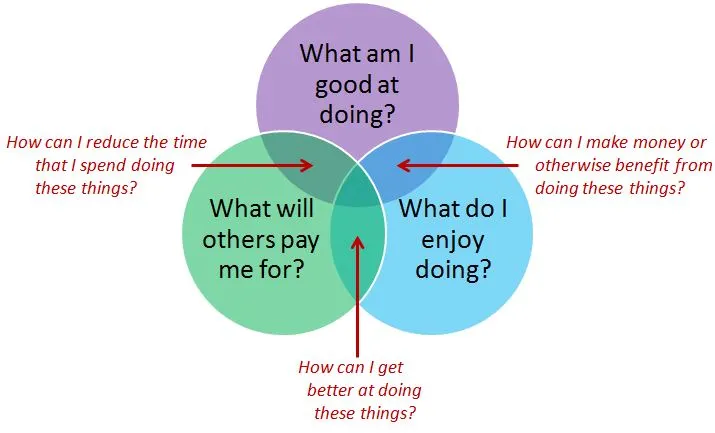Maybe the path to your happy life and self-satisfaction isn’t entreprepreneurship. Maybe the fact that you haven’t taken any action yet towards starting your thing is that deep down you don’t really want it. Maybe it’s just a more flexible job which you can do more on your terms. Spend more time with kids in the morning. Pick them up from school. Write an email instead of attending yet another pointless meeting with no agenda. Innovate. Or learn new skills because you feel you’ve plateaued in your role and won’t learn anything else.
Many people are not able to perform well not having a safety net, a framework and strong foundations on what the product, clients and the company are about. Once they have it, they thrive. Yet, this is what startups and entrepreneurs live and breathe in the first months (sometimes years) of their company’s existence.
Some people seem to follow hype, almost like forcing themselves into something they are not (well, that applies to many other life areas). Entrepreneurship, since being a synonym for jobless, has become something trendy, almost as if being an entrepreneur were a badge of honour.
The statistics say that about 90% of startups fail, 10% of them within the first year. And while there are many factors that play a role in building a successful company, people are the crucial one. When you just start, you often have nothing but an idea for a product (that you’ll pivot a 100s of times by the time you find a product-market fit). It’s just you and your persistence in figuring things out as you go. Doing the jump hoping the parachute will open in time.
Entrepreneurs by definition are people who are trying their own way to make things happen. Many entrepreneurs are at least slightly rebellious by nature and set off specifically to do things that have never been done before. They do many different things and have talents in many different areas. They thrive on challenges. They’re very persistent. They’re often not afraid to call other people out when things don’t seem right. And they’re not going to let anyone tell them “no.”
In Polish, there is a saying for such people: “If not through the door, then through the window” (~If you really want something, you’ll always find a way).
What others may see as reckless, entrepreneurs see as an opportunity for stepping out of their comfort zone and let their courage shine. Taking these risks in life is what drives them and keeps them focused on becoming the man they long to be. They never conform and always persevere.

“Procrastination is one of the most common and deadliest of diseases and its toll on success and happiness is heavy.”
Wayne Gretzky
From Battersea gig flyers to an AI software for the UK Police
I always knew I wanted to start my company but I wanted to run one for the right reasons. Have a mission and a product I believed in.
In Poland, parents often support kids financially during their first years of university. I could be living a pretty good student life, working part time and focusing on studies and enjoyment. But I wanted it the hard way.
So when I decided to move to London for uni, my mom’s salary was not even enough to cover a rent for a room in London. The highest qualified teachers in public schools earn on average ~730 GBP / a month. And the story of my absent / non-existent father who never supported us you already know. While the living costs are comparably lower in Poland vs the UK, when I moved to London, I had to earn a living. Between working crazy hours as a waitress and a concierge in London poshest restaurants and a bar woman, I was working out a sinister plan to take over the universe.. ehm, I meant – to make a dent in the universe :).
While bartending in one of the Battersea bars with live gigs, I soon offered the bar owner my graphic design services. Self-taught Corel and Photoshop while designing skins for The Sims from the age of 16, with a good eye for esthetics (so I think), soon I was earning nearly as much from designing flyers and banners as I was getting from my bartending salary and tips. I loved designing flyers (and soon a whole spectrum of branding; logos, stationery etc. for other clients) more than pouring G&Ts but I despised it being dependent on me doing the work.
I remembered the analogy that Nassim Taleb gave in his Black Swan book about the difference between scalable and non-scalable work. He compared a work of a prostitute with J.K. Rowling writing her Harry Potter books.
Professions where you are paid by the hour are not scalable. A prostitute who charges £100 an hour has only 24 hours in a day. At some point, she will hit a ceiling on her earnings. Similarly, dentists, lawyers, graphic designers, contractors and consultants can see only so many clients at a time. By contrast, scalable professions allow you to make more money without an equivalent increase in labour / time. J.K. Rowling needed to write Harry Potter books only once but her effort was pretty much the same whether she sold 500 or 500,000 copies.
Software companies fit nicely in the latter.
Just to set this straight – I was never motivated by money.
If I were, I’d accept to become a call girl when I got the offers (hello dodgy South Kensington people) instead of working my ass off for pennies (pun not intended 😅) and finishing catering shifts at 3am.
Money is great as it allows you to make an impact. My motivation to direct my professional career in technology was to make a positive difference in other people’s lives on scale, to matter. Now, through our work at Untrite, I finally feel that.
Do you really really want it?
“Only put off until tomorrow what you are willing to die having left undone.”
Pablo Picasso
Maybe you just want to have the best of two worlds – more security while having more space to experiment and innovate. Some people like to take things in their hands and lead. Some people like to follow. And one is not better than the other. It’s about being honest with yourself, understanding your strengths and putting them to best of use. If you have constant urge to create and set brains on fire, but haven’t found this one problem you’re passionate about, maybe intrapreneurship is the answer. Joining established company with an open-minded environment, or becoming a consultant, positioning yourself in your favourite niche and solving problems for other companies.
Where to start?

Not everyone is cut to build the next unicorn or hire 1000s of people. Not everyone should. We need those small businesses with owners fully dedicated to solve our problems. You can become a solo entrepreneur. You can have a lifestyle business. You can be an intrapreneur. There are many tastes and flavours of a career structure, each coming with pros and cons. More responsibility, less privacy… find something that makes you alive… and pays the bills.
So when you decide to start a business, don’t be as naive as I once was and don’t jump into unknown without having some kind of contingency plan when things don’t work out. Have at least 6 months worth of savings and cut your spending to absolute bare minimum. And ideally, don’t quit your job but move to a part time schedule. If you quit, you may have more time in the beginning, but you can also end up stressing yourself that things are not progressing as fast and savings are running out. Let me tell you that it doesn’t help your creativity.
It’s never too late to start a business, and in a way, the older you are, the better. Starting a business when your career is well established can be much better, because if things don’t go as planned, you can always go back to a hefty salary and quickly recoup your unrealised profits. It’s also great when you have a supportive, actively working partner who can take over $$ duties for when you’re figuring things out.
So go on, stop dreaming and start doing. Shoot for the moon and land among the stars, as they say. Or better, discover a new moon.


![Start-ups and start-downs [Evoque Journey] louveciennes @flickr](https://hankka.com/wp-content/uploads/2013/09/bfast.jpg)
![What are you afraid of? [Evoque journey] Donnie Nunley @Flickr](https://hankka.com/wp-content/uploads/2014/02/12331672305_9d924d76b0_z.jpg)

